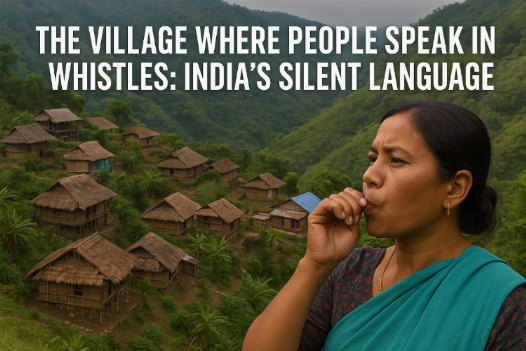Kongthong is a small village nestled in the lush hills of Meghalaya, a northeastern state of India. Home to the Khasi tribe, this village is unlike any other due to its peculiar mode of communication—each person has a unique whistled tune used in place of their name.
This tradition, known as "Jingrwai Iawbei" (meaning "Song of the Ancestors"), has been passed down through generations. It is believed to have originated as a way to call someone in the forest without attracting animals or other humans
1. Context or Origin
Kongthong is a small village nestled in the lush hills of Meghalaya, a northeastern state of India. Home to the Khasi tribe, this village is unlike any other due to its peculiar mode of communication—each person has a unique whistled tune used in place of their name.
This tradition, known as "Jingrwai Iawbei" (meaning "Song of the Ancestors"), has been passed down through generations. It is believed to have originated as a way to call someone in the forest without attracting animals or other humans.
2. Development of the Custom
When a child is born in Kongthong, the mother composes a melodious tune for them—a unique combination of whistling sounds that becomes their identity. This "tune-name" coexists with their formal name but is used far more often in everyday life.
The songs are soft, melodic, and personal—reflecting the mother’s emotions and creativity. They’re not just names but auditory fingerprints. The practice strengthens family bonds and helps preserve a deeply rooted tribal identity in a rapidly modernizing world.
Interestingly, villagers can recognize and recall hundreds of such whistle-names, demonstrating remarkable auditory memory.
3. Curiosities or Implications
-
No Two Whistles Are the Same: Each whistle is as distinct as a fingerprint.
-
Tourism Surge: In recent years, Kongthong has attracted attention from filmmakers and researchers worldwide.
-
Cultural Preservation: UNESCO and local government bodies are working to document and protect this vanishing oral tradition.
Some villagers have even started using mobile phones to record and send these tunes as ringtones or alerts—blending ancient custom with digital life.
4. Conclusion or Moral
In a world where voices compete for attention, the people of Kongthong choose music over noise. Their whistled language is not only a marvel of human communication but a poetic reminder that identity can be sung—not just spoken.
Preserving such traditions means protecting not just culture, but the very soul of human connection.
Sources
-
Kongthong: India’s Whistling Village – BBC Travel – https://www.bbc.com/travel/article/20200107-kongthong-indias-whistling-village
-
Meghalaya’s Musical Village – The Hindu – https://www.thehindu.com/society/kongthong-in-meghalaya-the-village-that-sings-your-name/article29830187.ece
